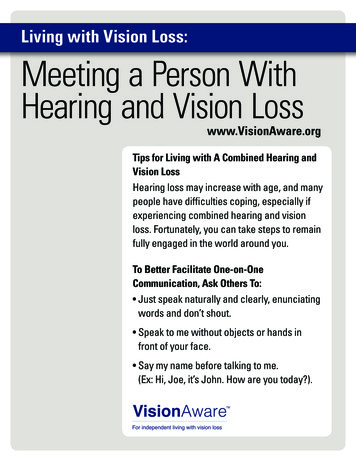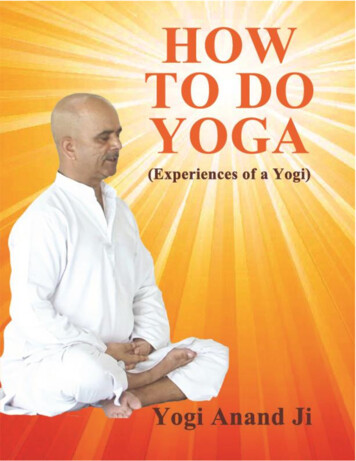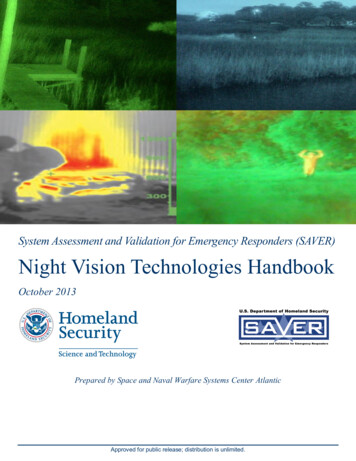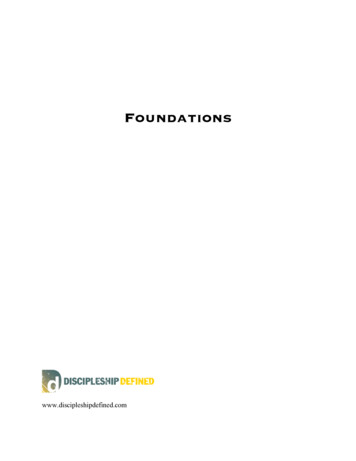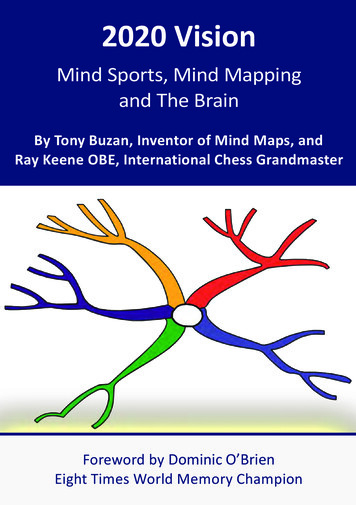
Transcription
2020Vision2020 VisionMindMind MappingMappingMind Sports,MindSports, MindMappingandBrainand TheThe BrainByof MindMindMaps,andBy TonyTony Buzan,Buzan, InventorByTonyBuzan,Inventor ofMind Maps,Maps, andandRayChessGrandmasterRayKeeneKeene OBE,OBE, InternationalRayKeeneOBE,International ChessChess GrandmasterGrandmasterForeword ŽŵŝŶŝĐ K͛ ƌŝĞŶForeword byForewordby ŽŵŝŶŝĐ K͛ ƌŝĞŶ ŽŵŝŶŝĐ K͛ ƌŝĞŶEightMemoryChampionEight TimesTimes WorldEightTimesWorld MemoryMemory ChampionChampion
2
mens sana in corpore sanoThis book is dedicated to the memory ofDr Marion Tinsley (1927-1995), the greatestMind Sportsman of them all.3
4
A message from Professor Barry Buzan,co-inventor of Mind Maps and co-authorof the first Mind Map Book, from whichthe following passage is quoted.Mind Mapping gave me a tremendous competitiveadvantage. It enabled me to assemble and refine my ideaswithout going through the time-consuming process ofdrafting and re-drafting. By separating thinking from writing,I was able to think more clearly and extensively. When itwas time to start writing, I already had a clear structure anda firm sense of direction, and this made the writing easier,faster and more enjoyable. I completed my doctorate inunder the prescribed three years, and also had time to writea chapter for another book, help to found, and then edit, anew quarterly journal of international relations, be associateeditor of the student newspaper, take up motorcycling, andget married (doing a Mind Map with my wife-to-be tocompose our wedding vows). Because of these experiences,my enthusiasm for the creative thinking side of thetechnique grew.Mind Mapping remains a central element in my wholeapproach to academic work. It has made it possible for meto sustain an unusually high output of books, articles andconference papers. It has helped me to remain a generalistin a field where the weight of information forces mostpeople to become specialists. I also credit it with enablingme to write clearly about theoretical matters whosecomplexity all too often inspires incomprehensible prose.5
6
FOREWORDby Dominic O’Brien,Eight Times World Memory ChampionStaggering Mental AchievementDid You Know That .? Tathagat Avtar Tulsi from Delhi, when aged six,calculated the value of pi to seven decimal places(3.1415927). The highest ever prize for a Mind Sports event was the 5 million shared by chess champions Bobby Fischerand Boris Spassky for their rematch in 1992. The world record number of internet hits for anysingle event was 22 million for the final game of theGarry Kasparov vs Deep Blue chess challenge in May1997 in New York. This game, which lasted less thanone hour, attracted 12 million more hits than the entirethree-week 1996 Atlanta Olympics. Thursday August 20, 2020, the final of the Milliondollar internet world tour , won by world championMagnus Carlsen against US Grandmaster HikaruNakamura, attracted a barely believable 70 millionviewers !! Both viewership and prize are online records. World Chess Champion Alexander Alekhine couldchallenge 28 master-strength players at one and thesame time and still win the majority of games, withoutseeing the board or pieces.7
The six-time world champion Anne Jones is creditedwith a record of 4200 words per minute. The currentrecord for memorising Pi. The US President and Congress declared the 1990s tobe the 'Decade of the Brain'. Hiroyuki Goto of Tokyo has memorised pi to 42,195digits. The greatest historical IQ has recently beenestablished as that of Leonardo da Vinci at 220. Readers of the Washington Post have voted GenghisKhan as the 'Brain of the Millennium'. The first Mind Sports Olympiad was held atLondon's Royal Festival Hall in August 1997.These are just a few of the astonishing mental feats andfacts catalogued here. The authors, Tony Buzan andRaymond Keene, are ground-breaking pioneers in thisarena, and themselves holders of impressive world records.Tony Buzan is the holder of the world creativity record,while Raymond Keene, in three hours, has played chessagainst 107 different opponents at one and the same time,losing just one game. He was afterwards able to recall themoves of all 107 games perfectly, from memory, with nomistakes.Together, they have also been at the forefront of globalpublicisation of mental literacy and mind achievements,and are acknowledged leaders in the field. Ray Keeneholds the world record for books published on chess andmental combat (205), while Tony Buzan's books have8
been translated into 48 different languages and havetotalled millions in worldwide sales. Both co-authors havetogether hosted or presented over 500 TV programmes onthinking and Mind Sports, while their track record,separately or in unison, in founding seminal Mind Sportsinitiatives, has been unrivalled - including the World ChessChampionships of 1986, 1993 and 2000, World DraughtsChampionships of 1992 and 1994, and the World MemoryChampionships from 1991 - 2019.Dominic O’BrienAugust 2020Sadly, Tony passed away tragically and prematurely inApril 2019, however his banner continues to be held aloftby a dedicated team, including: myself, Dominic, SaniaAlam, Chris Day, David Zhang, Lester He, Prince MarekKasperski, Barry Buzan, Vanda North, Alexander Keene,Don Morris, Dr Jorge Castaneda, Michel Wozniak, IanHunt, Dr Guo Chuanwei, Dr Sue Whiting, ProfessorMichael Crawford, Prince Mohsin Ali Khan of Hyderabad,Cllr Frances Staunton, Lord Hardinge of Penshurst andJulián Simpole.This book is a battle plan for the new era ushered inglobally by Covid 19.Keep your brain fit with Mind SportsKeep your body fit with Mindfulness and Healthy DietsKeep your creativity flowing with Mind MapsFight the boredom and flab of global lockdown with themarvellous invention of Tony and Barry BuzanRay Keene OBE9
10
Introduction by Ray Keene OBEInternational Chess GrandmasterGlobal President of the Tony Buzan GroupIn 1997, with Tony Buzan, Don Morris of the ChampagneAcademy and Sir Brian Tovey, Director General of GCHQ,I organised a multi Mind Games competition at London'sRoyal Festival Hall. The contest included various forms ofchess and its variants, such as Shogi, Xiangqi and Shatranj.It was during this event that Demis Hassabis distinguishedhimself by winning the Gold Medal for the most versatilecompetitor.The human brain has been described as the most complexstructure in the observable universe. Consider the facts. Yourbrain weighs about the same as a bag of sugar, approximately2 per cent of body weight, yet the brain alone accounts forup to 20 per cent of your body's energy needs. A thousandbillion nerve cells are packed into every human head, andthere are as many cells between your ears as there are starsin the Milky Way Galaxy. Each of these cells can beconnected with up to 100,000 others and just counting eachpossible nerve connection in the human brain cortex - theouter layer - at the rate of one per second, would take 32million years. Indeed, humankind's privileged place on theevolutionary ladder is not the result of powerful physique.Any self-respecting tyrannosaurus would easily have seenoff a feeble specimen of Homo sapiens if such a temporallyanomalous meeting had ever taken place.No, our place in evolution is entirely down to our massive11
mental power, unique in known creation. So, in my opinion,as a confirmed admirer, from a very early age, of theintelligent Odysseus, rather than the muscle-bound Achilles,described by Shakespeare, as "the sinew and the forehand ofour host", the true answer lies clearly to hand. If you reallywant to live long and prosper, forget about jogging, jumpingand honing those bronzed pectorals to glistening perfection.It's your brain you have to worry about. And one of the bestways to train your brain is to play chess, as Dr Joe Vergheseof the Albert Einstein Institute in New York, has confirmed.By playing any, or all, of these or other mind-stretchinggames, such as bridge, crossword solving, draughts, sudokuor scrabble, medical and psychological opinions now suggestthat you maximise your chances of a long and healthy life.Perhaps more importantly, one that remains at a high, evenincreasing, level of mental activity. Fitness and aerobics yes,but aerobics for the mind!How long will we live? "Three score years and ten" is themost commonly quoted biblical estimate, yet the Book ofGenesis itself (Chapter Five) suggests that the human spanshall be a hundred and twenty years. More recent officialfigures for the UK put a woman's average life expectancy at82.9 years and a man's at 79.3. But some experts nowbelieve that it should, with improved lifestyles and medicaladvances, be reasonable for all of us to reach 100. After all,the most rapidly increasing age group in the USA is the over85s, already with 50,000 centenariansInsurance companies devise actuarial tests to gauge longevityand, of course, their professional existence depends verymuch on getting this sort of thing right. Their questionsdivide up into fixed responses, i.e. items most people do notfrequently change, such as, are you male or female, or howlong did your parents live? Next, come variables, that is,12
items you can do something about.Interestingly, of the 20 plus key questions which arestandardly set, it is an eye-opener to see the huge extent towhich mental performance, IQ and Mind Sports-relatedanswers can make a difference, accounting for a staggeringleeway of up to 11.5 productive years in your favour! Braincells, or at least the ones that matter, do not inevitably dieoff as we age, nor do our mental powers automaticallydiminish. In fact, contrary to rumour and received opinion,brain power and articulacy can increase with age if the mindis kept active. The theory that we lose millions of brain cellsevery day, especially after a drink, has been widely acceptedfor years, but it is apocryphal. There is no scientific evidencefor automatic brain cell loss with age.The clinching examples which appeal to me are thesuperiority of later artistic works, such as Shakespeare's TheTempest, Leonardo's Mona Lisa and Beethoven's NinthSymphony.Consider this statement from Professor Arnold Scheibel,former head of the Brain Research Institute at UCLA LosAngeles:"What can the average person do to strengthen his or hermind? Anything that is intellectually challenging canprobably serve as a kind of stimulus for dendritic growth,which means it adds to the computation reserves in yourbrain. Do puzzles, try a musical instrument, try the arts, playtournament bridge or chess and remember, researchers,agree that it is never too late. All of life should be a learningexperience, because we are challenging our brain andtherefore building brain circuitry, this is the way the brainoperates."Additionally, research by Dr. Gordon Drw, also of UCLA,shows that higher brain functions can be improved by13
listening to Mozart's music. According to his research, thishas a similar effect on brainwaves to playing chess. Shawcompared three listening states Mozart's Sonata in D Majorfor two Pianos, a relaxation tape and silence and tested thesubjects' spatial reasoning after each tape. In the short termcertainly listening to Mozart raised IQ scores by an averageof nine points above the other two tapes.The beauty of competitive Mind Sports is that they are opento all. There are no barriers of gender, nationality or physicalability and no qualifying hurdles to jump, as it were.I have often advocated the possibility of a committee ofchess grandmasters coming together to help save the nationin times of adversity. The awesome collective brainpower ofchess experts, such as Conel Hugh O'Donel Alexander,Harry Golombek and Sir Stuart Milner-Barry, had beenharnessed once before to assist Alan Turing and theillustrious Nazi code breaking corps at Bletchley Park duringthe Second World War. Indeed, dulce et decorum est torecall their monumental achievements in shortening the warby up to two years and thus saving an estimated fourteenmillion lives.And then history repeated itself. On March 18 2020 Dr.Demis Hassabis FRS CBE, described by the Times as"probably the smartest brain in Britain", and originator ofAlphaZero, the strongest chess playing computer programever developed, had been invited by Government ChiefScientific Adviser, Sir Patrick Vallance, to attend SAGE, thegovernment committee (Scientific Advisory Group forEmergencies) designed to combat Covid-19. At the time ofmy writing about the codebreakers, the composition ofSAGE had been a closely guarded state secret, but in the lastfew days the rules on confidentiality have been relaxed inthe interests of transparency, and it has been revealed that14
Demis had been enlisted to serve in the national interest.Before delving further into this matter, let me first digress.In 1482, when Leonardo da Vinci was thirty years old, hewrote his famous employment application letter toLudovico Sforza, Duke of Milan. In it, he set out his full andimpressive CV, cataloguing his numerous qualifications forthe post.I am grateful to Michael Gelb, author of How to think likeLeonardo da Vinci, for his succinct description of Leonardo'sLetter containing his qualifications, which I havesummarised:"In his CV Leonardo asserted his unique expertise as ananatomist, botanist, City Planner, Designer, Engineer,Geologist, Musician, Painter, Sculptor, not to mentionmilitary strategist and inventor of the tank and theparachute, even though humans had not yet mastered theart of flight. In fact, Leonardo's dimensions and vertical /horizontal ratios for constructing a successful parachutewould have been accurate, even though no planes existedduring the Renaissance from which the hypotheticalparachutists might jump."Now, just imagine, having got wind of Leonardo'sappointment by the Duke, that the equally hypotheticalmainstream media of the day, say 'La Posta Quotidiana' and'II Guardiano', were outraged by the ducal promotion of amere artist and fulminated mightily against Leonardo's presence on Ludovico's staff. Unthinkable, you might think!But an outburst of rancorous moral indignation, based onDemis's ties to Google, is exactly what happened whenDemis tried to help the government and the nation. One ofDemis's multifarious qualifications is as an AI data specialist,and his skills must have been considered of significantimportance in combatting Covid-19. A five times World15
Champion in Tony Buzan's technique of Mind Mappingremarked to me, that with Demis on board, at least the antiCoronavirus measures will now work.Mirabile dictu, or perhaps not, instead of being grateful thata genuine British genius was prepared to volunteer forSAGE to save British lives, the Daily Mail and Guardianresorted to morally outraged, screaming headlines, such asthe Guardian's of April 30th: "Attendance of Demis Hassabis raises further questions about secretive group . ", orthe Mail's of the same date: "Anger as Google artificialintelligence expert is invited to secretive SAGE meeting . "followed by minatory utterances, such as: "outcry,concerned, scrutiny."Now is the time to cite some words of wisdom from aCentral European thinker who escaped the clutches of theNazis in good time: "There is perhaps no phenomenonwhich contains so much destructive feeling as 'moralindignation,' which permits envy or hate to be acted outunder the guise of virtue." Erich Fromm, German JewishPhilosopher 1900-1980.I first encountered Demis when he was eight years old andI was giving a chess simultaneous display against fifty-or-soStreatham school children, playing all games at once. All butone of my opponents succumbed without a fight, but onelittle dark-haired boy put up such a huge fight that I beganto doubt I could win. "Grandmaster fails to defeat eightyear-old" was a headline I wished to avoid, so I summonedup all my experience against my last opponent standing andafter a lengthy struggle I eventually won. It was though,absolutely obvious that this young kid already possessedformidable mental powers.Later, Demis, as a student at Christ's College, was torepresent Cambridge University in the annual Varsity Chess16
match against Oxford, win Gold Medal in Pentamind, themulti-game discipline of the Mind Sports Olympiad, and inhis own words, become world chess champion "by proxy."The justification for this claim was that, with his company,Deep Mind, Demis became the spiritus rector of thecomputer program which defeated the human WorldChampion in the fiendishly difficult oriental game of WeiChi (or as it is more commonly known: Go), a featpreviously considered impossible. Subsequently, his mostspectacular exploit has been to create AlphaZero, the mostpowerful chess program the world has ever seen, or is everlikely to see. Hence the chess championship by proxy quip.Indeed, Demis would have been equally justified in claimingthe proxy championship of the world of Wei Chi.AlphaZero has developed strategies which confound thetraditional ways of human thinking about chess. It sacrificesmaterial for virtually invisible long-term prospects, itconcentrates its forces and attacks, not by standardcentralisation, but by retreating its most powerful pieces tosquares at the rear and perimeter of the board, and it has nofear of simplification, even when suffering from significantmaterial deficit. There is no doubt that the current andfuture generations of chess Grandmasters are busy learningfrom AlphaZero and adapting to its strategies, many ofwhich are explained in the ground-breaking book GameChanger by the Grandmaster team of Matthew Sadler andNatasha Regan (in my opinion one of the most importanttexts on chess ever written.)A grateful Monarch and nation have already rewardedDemis with the CBE. As coronavirus is gradually pushedback, I predict that Demis will be able to add a flesh andblood knighthood to the wooden knights he manoeuvres sodeftly on his chessboard.17
I leave the final word to Demis himself -as he told theTimes: "There are so many problems out there fromAlzheimer's disease to climate change . where we seem tobe making almost no progress. I'd be much more pessimisticabout the way the world is going to go if I didn't know therewas something as game-changing as AI on the way."So what lessons can chess and other Mind Sports teach usfor the future, for the post pandemic world which willemerge from the trauma of the Coronavirus cataclysm?During the crisis, chess, in common with the weekly shop,has pivoted decisively towards online activity. Every majorchess tournament until the end of the year has now beenscrapped, including the British Championship, the elite Isleof Man Open and the Grand Chess Tour circuit.However, unlike the postponed 2020 Tokyo Olympics, chesscan easily be played online. The Four Nations Chess League,essentially the UK's internal team championship, hasswitched online. Arnold Schwarzenegger has appeared onsocial media, reliving a somewhat catastrophic loss to GarryKasparov, engaging in a humorous clash of chess arms withhis pet pony Lulu, but above all urging his vast onlineaudience to keep their brains fit and stimulated during theCovid lockdown, by taking up chess.On Twitter, Schwarzenegger recently tweeted at Kasparov:"Thanks for always giving back and teaching chess to kids.Because of your inspiration, chess is part of our after-schoolprograms. Now we have youth chess at every@ArnoldSports festival around the world. I hope to catchup soon & learn more!"Magnus Carlsen, the reigning World Champion, hasorganised an online tournament for the world's top eightplayers, including himself, with a record 1,000,000 prizefund for an online chess competition. Chess.com an online18
site where anyone can challenge human or computerisedopposition, learn about chess strategies, ploys and tactics,and, of course, also follow archived and live Grandmastergames, reports a surge in subscriptions during Coronabedevilled March 2020, that would normally have taken tenyears to achieve.The audience for chess now exceeds anything ever beforeseen in the history of the game, and it is all on line. It is myview that the indicators from the world of chess plot thefuture of the world at large. Buy shares in supermarkets withonline delivery services, expect online education and personal development resources to explode, look out for anexpansion of high-quality restaurants introducing homedelivery services and watch closely as newspapers wither andmedia vehicles transfer to online delivery of opinion andinformation. Indeed, YouTube already boasts more youngviewers than all UK terrestrial TV channels combined."Tournaments will be broadcast live across multiple outletsincluding Fide's and Chess.com's own channels acrossTwitch, YouTube, Mixer, Twitter, and other internationalstreaming platforms. With an estimated audience of severalmillion worldwide, commentary by chess experts will beconducted in multiple languages, including English, Spanish,Russian, Mandarin, French, German, Portuguese, Italian,Turkish and Polish.There is a point about chess, which expands what I saidearlier about the statistics of mass participation. Namely,that the digital future is not just one of sponsoredtournaments online for the elite, but that greater access ingeneral, and specifically for those previously excluded, couldevolve into a valuable social tool. Though chess clearlybegins and spreads historically as an elite game, it has sinceshown a considerable capacity to appeal to / console the19
disadvantaged - prisoners, the sick, those in tough conditions.Here are some statistics concerning one of the world's mostpopular online chess services: www.chess.com. This siteoffers chess tuition, live coverage of important tournaments,archives of outstanding games from the past and, of course,the facility to compete against human or computeropponents around the world, at any time of the day or night,whenever and wherever you are. According to some YouGovstatistics of a couple of years ago, globally there were 600million chess enthusiasts - a figure that was much denigratedby a handful of doubting Thomases.At the time of writing chess.com could proudly boast thatthey had some 30 million members and that an astonishing4,453,868 games had been played online, on their site alone,during the day I checked. On Wednesday April 23, justtwelve days later, I returned for an update. Membership hadrisen to 36,092,133, while the total of games played duringthe past twenty-four hours had increased to 4,850,067. Ifone site can attract such numbers, it does not demand a hugeleap of faith to accept the veracity of that old figure of 600million chess enthusiasts around the planet. Indeed, asalready noted, chess.com reported that during March aloneof 2020, their subscriber base had increased by a quantitythat would normally have taken them ten years to achieve.It is evident that this bonanza has been driven by themultiple national lockdowns caused by the Coronavirus. Asentire populations retreat into the fortresses of their ownhomes and pull up the drawbridges behind them, it hasbecome apparent that chess, as a challenging and stimulatingmental exercise, is the ideal activity for isolated individualsand families to fill their newly discovered spare time. Photosnow appear regularly on social media of grandparentsplaying chess against their grand-offspring, the English Chess20
Federation in conjunction with the charity Chess in Schoolsand Communities has launched an ambitious onlineprogramme to attract a million school kids to take up chess,and the ease with which chess can now be played onlineaccounts for the massive surge in membership for chess.com- which is, in fact, just one chess site among many.The most indicative chess trend, with reverberations for theworld at large, is that major chess events are now movingrapidly online, and may well stay there. The games betweengrandmasters and champions remain just as exciting andinstantly accessible as physical events. Expert live and onlinecommentary is readily available. Why spend money onhotels, travel, meals and an expensive playing venue, whenall such costs can be spared and funds poured instead intothe prize purse? Online chess is a win-win situation for bothorganisers and competitors. This trend is visibly spreading toother mind sports. The World Mind Mapping, SpeedReading and Memory Championships, all dreamt up by thefertile brain of the late Tony Buzan, are now considering anonline dimension.CONCLUSIONSo, as we retreat behind our individual castle ramparts, it isbecoming apparent that in the post Covid-19 environment,those enterprises will flourish which can adapt to onlinedelivery of their services. After 9/11, the act of applying fora high street business bank account gradually became anexercise in pulling teeth. Last week it took just half an hourto open an account with Starling Bank, a purely onlineventure. More or less simultaneously, another bank, the21
venerable Coutts, founded in 1692, sent out emails topromote online ordering of home delivery meals. Thebountiful choice embraced ready to serve cuisine fromgourmet restaurants, delicatessen standard fresh food,ranging from Cornish crabs and lobsters to vegetables andfruit from English and European market gardens.Furthermore, Bread Ahead Bakery in Borough Market haveinstituted daily online tutorials, delivering flour and yeastfor home-baking, while giant eggs are on offer via onlineordering from Norfolk Geese. These are a tiny sample of awide and rapidly expanding trend. A whole new land ofplenty has opened up online, without the need to stir fromone's home.Sadly, however, those which cannot will go the way of thedinosaurs after the Chicxulub extinction event at the endof the Cretaceous period. The future is online and, asmillions of new devotees are discovering, online Mind Sportsare helping to show the way.Ray Keene OBEGlobal PresidentThe Tony Buzan Group22
Former WorldChess ChampionGarry KasparovFormer World DraughtsChampion Dr Tinsleyand Chinook23
MIND SPORTS BACKGROUNDChessChessplayers are ranked according to gradings devised bythe World Chess Federation (FIDE). A moderate club playerwould have a ranking of between 1000 to 1200; a class 'A'player a ranking of 1800 ; an expert a ranking of 2200 ; anInternational Master a ranking of 2400 ; and a top-rankingInternational Grandmaster a ranking of over 2700.World Champion Garry Kasparov is a particularly goodexample of a well-rounded and integrated, holanthropichuman being. His friends describe him as a cultivated andcurious man who closely follows literature, film and politics.To keep his brain in shape he keeps his body in shape. Heruns, swims, cycles and plays soccer as part of his trainingprogramme for World Championship matches. Kasparovmakes full use of the range of his mental skills while playing.He is described as the artist of the chessboard, taking boldchances, making breath taking sacrifices and hunting for theopponent's king with passion. 'From the very beginning ofa game, I strive to make it as sharp as possible and to take itoutside the familiar patterns,' he once said.Kasparov states: 'For me, chess is above all art, with elementsof science and sport.'Speed ReadingSpeed reading tests are primarily based on the reading ofnovels. The reader has to read an entire novel as fast aspossible, subsequently giving a presentation to people whohave already read the novel in depth. This presentation has24
to include knowledgeable comments about and integrationof the following main areas: characters, setting, plot,philosophy, symbolism, language level, literary style,metaphor, themes and historical context.CreativityCreativity is defined by Torrance, the doyen of creativitytesting, as follows: 'Creativity is a process of becomingsensitive to problems, deficiencies, gaps in knowledge,missing elements, disharmonies and so on; identifying thedifficulty; searching for solutions; making guesses orformulating hypotheses about the deficiencies; testing andre-testing these hypotheses and possibly modifying and retesting them; and finally communicating the results.'Torrance Tests of creative thinking were developed to assessthe process and especially the ability of the subject to thinkdivergently and originally. Such tests also challenge the testtaker not only to find a solution, but actually to invent theproblem to which he or she will provide a solution. Thesuccess of the test-taker will express itself through thedivergent thinking factors of fluency; flexibility; originalityand elaboration. It is argued that every creative productionis at the same time the result and manifestation of these fourfactors of divergent thinking.Fluency reflects the test-taker's ability to produce largenumbers of ideas with words (verbal fluency) or withpictures (figural fluency). Quantity or ease with whichassociations flow is the main characteristic.Flexibility represents the test-taker's ability to producedifferent kinds of ideas; the ability to shift from oneapproach to another raising a rich variety of strategies.Originality represents the ability to produce ideas that are25
unusual, unique, and far removed from what is normal orcommonplace. A person scoring high in originality may beperceived as nonconforming, but this does not mean thatsuch a person is either erratic or impulsive. On the contrary,originality is the result of considerable 'controlled'intellectual energy, and generally a capacity for high levelsof concentration.According to Torrance, high scores on elaboration indicatethat the subject is able to develop, embroider, embellish,carry out or otherwise elaborate ideas. Such persons arelikely to demonstrate keenness or sensitivity in observation.Normal scores in the verbal scale are:Fluency77Flexibility 27Originality 37The highest registered scores in the world to date wereachieved by co-author Tony Buzan: Fluency 249, Flexibility
Mind Sports, Mind Mapping and The Brain By Tony Buzan, Inventor of Mind Maps, and Ray Keene OBE, International Chess Grandmaster. 2. mens sana in corpore sano This book is dedicated to the memory of Dr Marion Tinsley (1927
